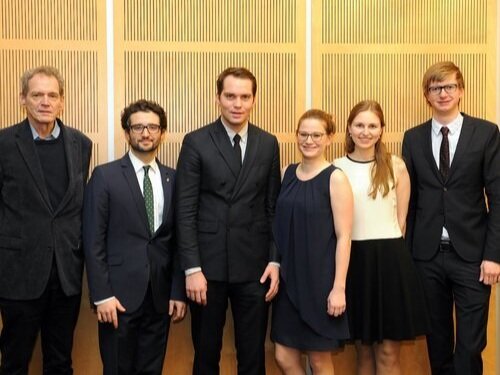Obermayer German Jewish History Award
Gernot Römer
Augsburg, Bavaria
Since the early 1970s, Gernot Römer has dedicated himself to publishing a record of the contributions made by Jews in Schwaben to the cultural, political and economic life within that region of Germany. His research, writings and exhibitions span the entire province of Schwaben and reach a very large audience.
For those like Arnold Erlanger, who experienced the Holocaust, Gernot Römer’s work is a sacred mission. His research and publications educate the German people about the past, while honoring those who died. His work is a living testament that can help educate future generations about the price of bigotry. From the time Gernot Römer became editor of the important Augsburg daily, “Augsburg Allgemeine” in 1971 and even more so since his retirement in 1994, he used every opportunity to educate the public about the history and achievements of Jews in Schwaben. Through television documentaries, exhibitions, and articles, he has become a keeper of history. He has never been deterred by the threats he received over the years. Gernot Römer’s historical accounts and his educational work in schools and with youth organizations detail the Holocaust and pre-Holocaust years in the Jewish communities of Schwaben. Many of his books and articles deal with the intense personal suffering of individual families. His repository of information has also helped many families to understand their family’s experiences.
He has been of invaluable assistance to the Jewish Museum of Augsburg in the preparation of specific exhibits. Gernot Römer took on the task of asking the City of Augsburg to put up a memorial with the names of the city’s Holocaust victims. He has been conducting careful research for this project for over two years in order to insure that no name is omitted, since this stone tablet will be their only gravesite.
THIS WALL BRINGS PEOPLE TOGETHER
Students at this Berlin elementary school, built on the site of a synagogue, have been building a wall for the past two decades. It delivers a powerful message about community.
STUDENTS REACHING STUDENTS
When a handful of ninth graders from Berlin met Rolf Joseph in 2003, they were inspired by his harrowing tales of surviving the Holocaust. So inspired that they wrote a popular book about his life. Today the Joseph Group helps students educate each other on Jewish history.
“I SPEAK FOR THOSE WHO CANNOT SPEAK”
Margot Friedländer’s autobiography details her struggles as a Jew hiding in Berlin during World War II. Now 96, she speaks powerfully about the events that shaped her life and their relevance today.



